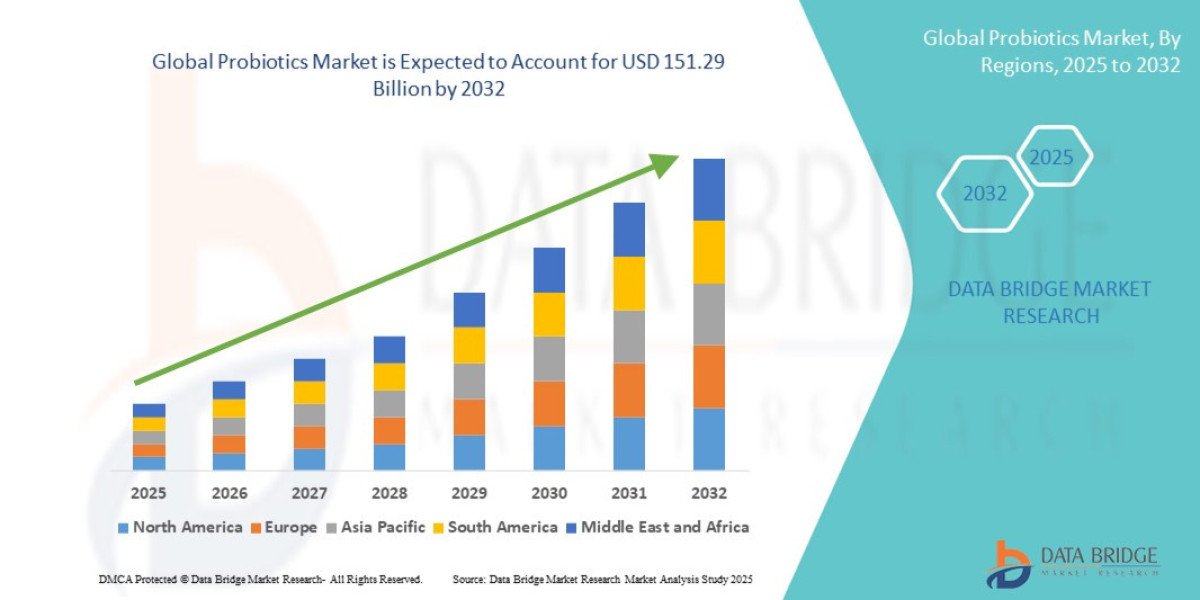Introduction
The probiotics market has emerged as one of the fastest-growing segments of the global health and wellness industry. Probiotics are live microorganisms, primarily bacteria and yeasts, that provide health benefits when consumed in adequate amounts. They are widely used in dietary supplements, functional foods, beverages, and animal feed. Their relevance today is undeniable, as consumers increasingly prioritize gut health, immunity, and holistic wellness.
The global importance of the probiotics market extends beyond consumer health. It is also reshaping the food and beverage industry, influencing agricultural practices, and creating new opportunities for pharmaceutical innovation. With rising awareness of preventive healthcare and natural products, probiotics are positioned at the intersection of nutrition and medicine.
This report explores the probiotics market in depth, analyzing its current landscape, growth drivers, restraints, segmentation, competitive dynamics, and future outlook. The scope also highlights opportunities for businesses and investors as the market transitions from niche wellness to mainstream adoption.
Source - https://www.databridgemarketresearch.com/reports/global-probiotics-market
Market Overview
The probiotics market encompasses live microorganisms incorporated into food products, supplements, and animal feed that confer benefits such as improved digestion, enhanced immune response, and prevention of gastrointestinal disorders. Key strains include Lactobacillus, Bifidobacterium, and Saccharomyces boulardii, each serving distinct therapeutic and functional roles.
Historically, probiotics gained traction in Asia, where fermented foods such as yogurt, kefir, kimchi, and miso were staples. Over the past two decades, Western markets have adopted probiotics, driven by scientific validation of their health benefits and growing consumer interest in functional foods. Today, probiotics are mainstream across global markets, with applications spanning preventive health, sports nutrition, and veterinary care.
The current landscape is marked by strong demand from food and beverage manufacturers. Probiotic-enriched dairy products, juices, and dietary supplements dominate the category, while emerging applications in skin health, weight management, and women’s health are expanding the market’s scope. Meanwhile, animal feed probiotics are gaining popularity as sustainable alternatives to antibiotics, aligning with global efforts to reduce antimicrobial resistance.
Market Drivers and Opportunities
Several factors are fueling growth in the probiotics market. Rising consumer awareness of gut microbiota’s role in overall health has created demand for natural, functional solutions. Probiotics are increasingly positioned as preventive healthcare products, reducing reliance on pharmaceuticals while supporting long-term wellness.
The shift toward personalized nutrition represents a major opportunity. Advances in microbiome research allow companies to develop targeted probiotic formulations tailored to age, gender, and health conditions. This personalization enhances efficacy and consumer trust.
Technological innovations also create opportunities. Microencapsulation and advanced fermentation processes are improving probiotic stability, shelf life, and effectiveness. This allows manufacturers to incorporate probiotics into a wider range of products, from non-dairy beverages to baked goods.
Additionally, the growing adoption of probiotics in animal husbandry presents a lucrative avenue. As regulatory bodies restrict antibiotic use in livestock, farmers are turning to probiotics to maintain animal health, improve growth performance, and enhance feed efficiency.
Emerging economies offer further opportunities. Rising disposable incomes, urbanization, and increasing awareness of preventive healthcare in regions such as Asia-Pacific, Latin America, and the Middle East are driving demand for probiotics across both human and animal health applications.
Market Challenges and Restraints
Despite strong growth potential, the probiotics market faces significant challenges. Regulatory complexities remain a major barrier. Probiotic products are subject to varying regulations across regions, particularly in terms of health claims. The lack of global harmonization makes it difficult for companies to market products internationally with consistent messaging.
Product stability is another concern. Probiotics are sensitive to heat, light, and humidity, which can compromise their viability during manufacturing, storage, and transportation. Ensuring adequate shelf life without compromising efficacy requires advanced technologies and increases production costs.
Competition from prebiotics and synbiotics also presents a restraint. While probiotics dominate the gut health category, prebiotics—dietary fibers that stimulate beneficial bacteria—are gaining traction. Synbiotics, which combine probiotics and prebiotics, may divert some market share.
Finally, consumer skepticism remains a challenge. Despite growing awareness, some consumers remain wary of probiotic efficacy due to inconsistent product quality or lack of clear labeling. Addressing this requires transparent communication, clinical validation, and stricter quality assurance across the industry.
Market Segmentation Analysis
The probiotics market can be segmented by product type, end-user application, distribution channel, and region.
By product type, probiotic foods and beverages dominate, accounting for the largest share of the market. Yogurt, kefir, fermented drinks, and fortified juices remain consumer favorites. Dietary supplements, including capsules, powders, and tablets, are also growing rapidly due to convenience and portability. Animal feed probiotics represent another significant segment, with strong adoption in poultry, swine, and cattle industries.
By end-user application, the human health segment leads, driven by demand for digestive health, immunity support, and preventive care. Emerging areas such as skin health and weight management are expanding consumer reach. The animal health segment is gaining momentum, fueled by regulations limiting antibiotic growth promoters in livestock.
By distribution channel, supermarkets and hypermarkets dominate, offering wide access to probiotic-enriched foods and beverages. Pharmacies and health stores account for a significant share of supplements, while online channels are growing quickly, driven by e-commerce adoption and consumer demand for direct-to-consumer health products.
Regionally, Asia-Pacific leads the global probiotics market due to high consumption of fermented foods and growing healthcare awareness. Countries like Japan, China, and India are major contributors. Europe follows closely, driven by regulatory support for functional foods and rising demand for clean-label products. North America is expanding rapidly, with a strong emphasis on dietary supplements and personalized nutrition. Latin America and the Middle East are emerging markets, fueled by increasing urbanization and health-conscious consumers.
Competitive Landscape
The probiotics market is highly competitive, featuring multinational corporations, regional players, and startups. Global leaders include food and beverage giants, pharmaceutical companies, and specialized probiotic manufacturers. These firms leverage extensive research and development capabilities to expand product portfolios and maintain consumer trust.
Recent mergers, acquisitions, and partnerships have reshaped the competitive landscape. Collaborations between food manufacturers and biotech firms are enabling the development of advanced probiotic formulations with enhanced stability and targeted benefits. Startups are also gaining traction, particularly in the personalized nutrition space, where niche products appeal to health-conscious consumers.
Key strategies adopted by industry players include expanding product lines into new categories, such as non-dairy probiotic beverages or probiotic-infused snacks. Marketing strategies often emphasize transparency, clinical validation, and clean-label formulations to address consumer skepticism. Companies are also investing in digital platforms to engage with consumers directly and strengthen brand loyalty.
Sustainability initiatives are becoming a competitive differentiator. Firms focusing on eco-friendly packaging, reduced waste in production, and responsible sourcing of raw materials are increasingly favored by environmentally conscious consumers.
Future Outlook and Trends
The probiotics market is poised for significant growth over the next decade, driven by scientific advancements, rising health consciousness, and expanding applications. The global focus on preventive healthcare and immune support, particularly following the COVID-19 pandemic, has elevated probiotics from a niche wellness product to a mainstream necessity.
Technological innovation will play a key role in shaping the market’s future. Strain-specific research will enable the development of targeted probiotics addressing conditions such as irritable bowel syndrome, allergies, and metabolic disorders. Smart delivery systems, such as encapsulated probiotics designed to survive gastric acidity, will improve efficacy and broaden product applicability.
Sustainability will also define the market’s trajectory. Companies that integrate environmentally friendly practices into sourcing, production, and packaging will gain a competitive edge. Clean-label products free from artificial additives will resonate strongly with health-conscious consumers.
Geographically, Asia-Pacific will remain dominant, but North America and Europe are expected to witness strong growth in personalized nutrition and supplement categories. Emerging markets will become hotbeds of opportunity, driven by rising disposable incomes and growing acceptance of functional foods. Overall, the probiotics market is set to evolve into a cornerstone of global health and wellness.
Conclusion
The probiotics market has evolved from traditional fermented foods to a global industry spanning supplements, functional foods, beverages, and animal feed. It is driven by consumer demand for preventive healthcare, technological innovation, and regulatory shifts promoting natural alternatives to pharmaceuticals. While challenges such as regulatory complexity and product stability persist, opportunities in personalization, sustainability, and emerging markets highlight the industry’s long-term potential.
For stakeholders, the probiotics market represents not only a lucrative investment opportunity but also a chance to shape the future of global health. Companies that embrace innovation, transparency, and consumer-centric strategies will be well-positioned to thrive in the coming decade.
Frequently Asked Questions
What is the current size of the probiotics market?
The probiotics market is experiencing robust growth, with demand rising across food, beverage, supplement, and animal feed categories. While figures vary across sources, the consensus is that the industry is expanding steadily, with a healthy compound annual growth rate.
What are the key drivers influencing growth in this market?
The main drivers include increasing awareness of gut health, growing demand for preventive healthcare, advances in microbiome research, and the rising popularity of functional foods and beverages. Technological innovations are also making probiotics more stable and effective.
Which regions dominate the probiotics market?
Asia-Pacific leads the global market, supported by traditional consumption of fermented foods and rising healthcare awareness. Europe and North America also hold significant shares, with growing demand for dietary supplements and functional beverages.
Who are the major players in the industry?
The market features a mix of global corporations, biotech companies, and startups. Food and beverage giants, pharmaceutical firms, and specialized probiotic manufacturers dominate, while niche players are gaining ground in personalized nutrition and clean-label segments.
What are the latest trends shaping the future of the probiotics market?
Emerging trends include personalized probiotic formulations, sustainable and clean-label products, probiotic applications beyond gut health (such as skin and immunity), and technological innovations like microencapsulation to improve stability.
What challenges could slow down growth in this sector?
Challenges include regulatory complexities, product stability issues, competition from prebiotics and synbiotics, and lingering consumer skepticism. Addressing these requires investment in research, quality control, and transparent communication.
How can businesses benefit from investing in the probiotics market?
Businesses can capitalize on consumer demand for preventive healthcare, personalization, and sustainability. By offering innovative, clinically validated, and eco-friendly products, companies can capture growing demand and build long-term consumer trust.
Browse More Reports:
Global Food Certification Market
Global Functional Food Market
Global Genetically Modified (GMO) Seeds Market
Global Heat Pumps Market
Global Immunosuppressant Market
Global Insect Protein Market
Global Instant Beverage Premix Market
Global Internet of Robotic Things (IoRT) Market
Global Liquid Biopsy Market
Global Luxury Car Leasing Market
Global Metallic Stearates Market
Global Mining Tailings Management Market
Global Organic Meat Products Market
Global Pilates Equipment Market
Global Plastic Tumblers Market
Global Processed Meat Market
Global Resistant Starch Market
Global Surface Acoustic Wave (SAW) Market
Global Surgical Lights Market
Global Treehouse Glamping Market
About Data Bridge Market Research:
An absolute way to forecast what the future holds is to comprehend the trend today!
Data Bridge Market Research set forth itself as an unconventional and neoteric market research and consulting firm with an unparalleled level of resilience and integrated approaches. We are determined to unearth the best market opportunities and foster efficient information for your business to thrive in the market. Data Bridge endeavors to provide appropriate solutions to the complex business challenges and initiates an effortless decision-making process. Data Bridge is an aftermath of sheer wisdom and experience which was formulated and framed in the year 2015 in Pune.
Contact Us:
Data Bridge Market Research
US: +1 614 591 3140
UK: +44 845 154 9652
APAC : +653 1251 975
Email:- corporatesales@databridgemarketresearch.com







